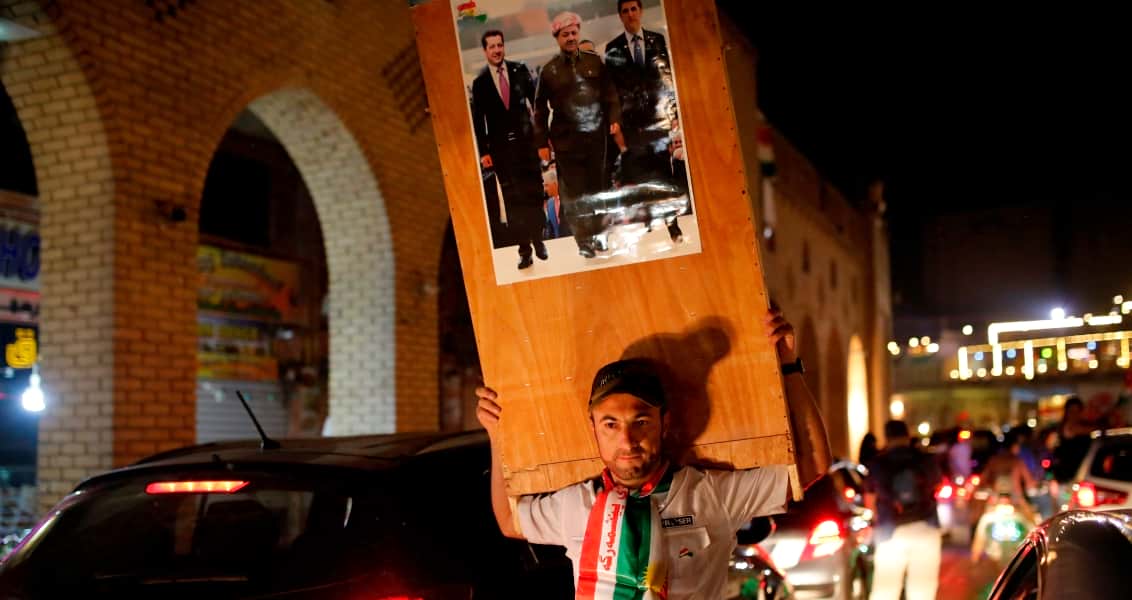
KRG Referendum Has Opened a Pandora's Box
Barzani is likely to discover that he committed an existential mistake when the chain reactions from his drive for independence begin to emerge
Share
Thanks to the illegitimate referendum in northern Iraq hastily organized and held by the Kurdistan Regional Government (KRG) in contravention of the Iraqi constitution, we have a brand new source of instability and tension in an already volatile region of the Middle East. Despite strong warnings from the central Iraqi government and regional players, including Turkey and Iran, KRG President Masoud Barzani chose the dangerous and destabilizing path of forcing full independence in an attempt to galvanize his shaky leadership. History is full of ample examples that dramatically teach us the lessons on how major territorial changes in the Middle East tend to occur through wars and full-scale conflicts. Therefore, the Barzani administration's decision to risk all of their economic and geo-political gains acquired over the course of the last decade for the sake of gaining the status of statehood seems like Russian roulette.
Since the rejection of the motion to allow the U.S. invasion of Iraq from Turkey in Parliament in 2003, Turkey has been an active partner in the reconstruction of northern Iraq. The KRG owes Ankara and President Recep Tayyip Erdoğan dearly for playing a facilitating role in the provision of necessary infrastructure investments, know-how and international links that were desperately needed for the speedy development in Iraqi Kurdistan. It was major Turkish construction companies that turned Irbil into an attractive urban center with massive investments with the active support of Turkish government institutions. Most of the materials needed for new roads, residential complexes and shopping malls as well as industrial machinery and cars were procured from Turkey. Not surprisingly, Iraq has always been one of the top-three trading partners of Turkey in recent years, and the KRG made substantial gains out of this trade by utilizing its position on the border by re-exporting Turkish goods to the rest of Iraq. Turkey's substantial export potential, which currently stands around $8.5 billion annually, is testament to these positive developments.
Turkey enabled the transport of oil from Iraqi Kurdistan to world markets through an oil agreement with the KRG despite U.S. objections and provided a major lifeline to the oil-based economy there through the pipeline that reaches Ceyhan. Erdoğan personally honored Barzani on many occasions, inviting him as the guest of honor to a Justice and Development Party (AK Party) meeting and the historic meeting in Diyarbakır at the height of the reconciliation process with the Kurdish community in Turkey. Faced with terrorist challenges at home from the PKK, which tries to marginalize Kurds against the Turkish state and the Democratic Union Party (PYD) forming a corridor in northern Syria with the support of global powers, Erdoğan valued his friendship and alliance with the KRG. Now it is not surprising to see that the Barzani administration's inconsiderate decision to pursue the futile course toward independence rightly raises the strongest reaction from Erdoğan, as he was the leader who worked hardest to ensure the integration of the KRG into the regional fabric.
But it would not be appropriate to portray Ankara's reactions to the KRG as purely nationalistic responses against the idealized right to self-determination of Iraqi Kurds. There is a major Kurdish population in Turkey, and around half of that population supports the AK Party led by Erdoğan. Unlike Iraq or Syria, the Kurdish population in Turkey is not ethnically isolated within certain regions. On the contrary, they live as a fully integrated part of Turkish society through marriage and other social integration. Therefore, Ankara's efforts to dissuade Barzani from pursuing full-fledged independence are based on historically acquired knowledge that this decision might open up a Pandora's box in Turkey's vicinity and trigger a chain of ethnic and sectarian secessionist conflicts with dramatic humanitarian consequences. Erdoğan's calls for economic sanctions ranging from the cancellation of civilian flights to northern Iraq to closing the Habur Border Gate, which sees around 7,000 trucks pass daily, and stopping the flow of oil from the pipeline are intended as measures to preserve regional stability, rather than to harm the Kurdish population in northern Iraq in any way.
The KRG and Barzani should be aware of the long-term consequences of the regional and international isolation they are attracting to themselves with the premature move for independence. The whole process leading to the independence referendum did not emerge out of local dynamics or endogenous desires of the Kurdish population for self-determination. On the contrary, they were imposed on the KRG as part of a regional design by global powers that intend to create new easily controllable micro-states in northern Syria and northern Iraq with divided Kurdish populations. The PYD as a natural ally of the terrorist PKK, and its People's Protection Units (YPG) militia currently controls the northern corridor in Syria as a result of forceful exile of Kurds who do not share its socialist ideals. A potential PYD area in a newly structured Syria might be positioned as a vassal state of global powers to control the flow of oil to the Mediterranean while the KRG and Barzani are encouraged to pursue full independence to provide rich oil resources to that vassal state.
By isolating itself from major regional powers, the KRG is pulled toward a corner in which the only potential allies would be the PYD – a terrorist group – and Israel – a state that constantly challenges regional stability and disregards international law. Barzani is likely to discover that he committed an existential mistake when the chain reactions from his drive for independence begin to emerge. But then it might be too late to take off the hefty human cost that must be borne by the Kurdish population in northern Iraq.
[Daily Sabah, September 30, 2017]
Tags »
Related Articles







